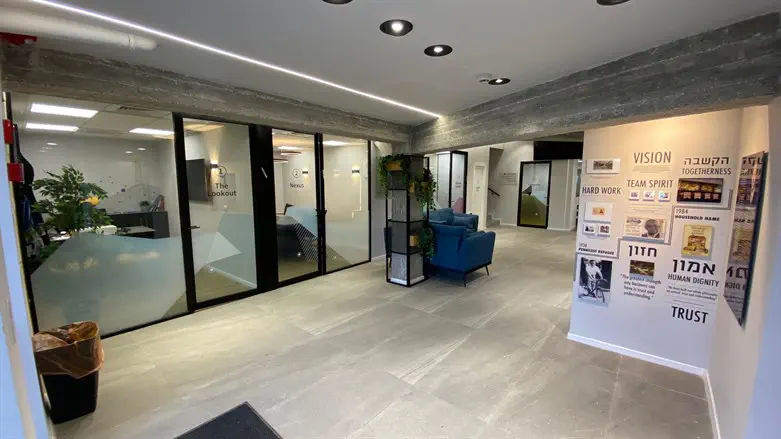
The Jerusalem College of Technology (JCT) has dedicated its LevTech Entrepreneurship Center in memory of Holocaust survivor and wood technology pioneer Chaim Shmuel Schreiber z”l as well as in honor of his wife Sara (Weinstock) Schreiber, representing a tribute to their history of innovation and perseverance.
Launched in October 2017, the newly dedicated Schreiber LevTech Entrepreneurship Center works to educate, inspire, and foster innovation among students, graduates, and faculty from the Orthodox and haredi communities. By providing the training, platform, and a physical hub where students can connect and turn ideas into reality, Schreiber LevTech helps them build a vibrant entrepreneurial future. Schreiber LevTech delivers a wide range of experiential and practical learning activities including hackathons, courses, workshops, tech and business mentoring, and pre-accelerator and accelerator programs. Graduates of Schreiber LevTech programs see themselves as leaders and innovators capable of creating products, establishing start-ups, serving as entrepreneurial leaders, and cultivating systemic change in their communities.
Made possible by the support of the Schreiber Charitable Trust of London, the dedication of Schreiber LevTech comes as the center is undergoing a significant expansion and renovation that enables JCT students, graduates, and faculty to work in start-up teams in a shared workspace area and dedicated start-up offices, receive hands-on experience in a makerspace with electronics equipment, and develop new features for existing products in a tech library.
The center’s namesake, Chaim Schreiber, was the only member of his family to survive the Holocaust. He taught himself the art of wood inlay, and won a scholarship to study architecture in Vienna, where he lived until World War II. He escaped to the UK, penniless, but skilled and determined. During World War II, Chaim used his talent with wood at De Havilland Industries designing the wings of the Mosquito fighter-bomber. He married Sara Weinstock in 1942, and they started a business in their small flat in Tottenham making picture frames.
Developing his expertise in wood technology, Chaim patented a process for molding plywood and started producing cabinets for radio and television sets. Ever the entrepreneur, he decided he wanted to produce his own end-product rather than be dependent on the large manufacturers of TVs, and he went into the furniture business — first making self-assembly tables, then bedroom cabinet furniture, and eventually furniture for all of the home. Schreiber Furniture became the best-known and most trusted brand in UK furniture by the early 1980s. He merged the company with the General Electric Company into GEC-Schreiber, making furniture and domestic appliances. He passed away in 1984.

“Given his entrepreneurialism as well as his personal and professional values, Chaim Schreiber is an ideal role model for today’s JCT students and those who will follow them in the generations to come,” said Orlee Guttman, JCT’s Director of Strategic Partnerships and Co-Founder of the Schreiber LevTech Entrepreneurship Center.
“In addition to the innovation he ignited in his industry, he was well ahead of his time in his enlightened policies towards his employees, believing fervently in the integrity of the working man and building relationships with many thousands of employees on trust and, in return, earning outstanding loyalty, productivity, and commitment. We are grateful for the inspired support of the Schreiber Charitable Trust of London, which empowers Schreiber LevTech to take significant steps forward in strengthening the high-tech ecosystem of Jerusalem and all of Israel.”
Through Schreiber LevTech, JCT students gain access to the resources and opportunities that help them create products, hone their skills, and think innovatively, while working under the professional guidance of professional business and tech mentors. They build teams and design products through participating in LevTech LAB, a pre-accelerator program; identifying tech solutions for challenges presented by companies and social service organizations in campus hackathons (technology marathons); and engaging in LevTech Talks, which encourage creative thinking in the business and high-tech spheres.
